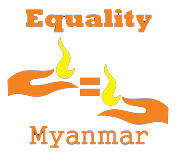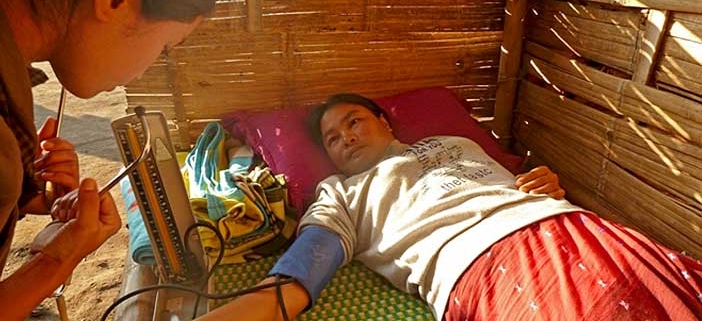TUESDAY, 31 JANUARY 2012
Humanitarian workers in northern Burma have expressed deep concern about the health conditions of thousands of war refugees in Kachin State who have been displaced along the Sino-Burmese border for eight months.
Aid workers said that preventable illnesses caused by unsanitary conditions and cold weather are taking their toll on more than 45,000 internally displaced persons (IDP) in two dozen camps as sporadic fighting between the Burmese government army and Kachin Independence Army (KIA) continues.
Speaking with The Irrawaddy on Tuesday, Mai Li Awng, a spokesperson for a local Kachin relief group known as Wun Tawng Ningtwey (Light for Kachin People), said that refugee children in temporary shelters suffer from diarrhea as they must use dirty water and do not have enough toilets.
Local humanitarian aid workers reported just five latrines for more than 1,200 people in one camp, according to a report released on Tuesday by Integrated Regional Information Networks (IRIN)—a news analysis service of the United Nations Office for the Coordination for Humanitarian Affairs.
Mai Li Awng said that 13 elderly people died between the last week of December and January, with six of them from Maija Yang town near the Chinese border.
She also said that young people in some IDP camps are lacking access to education as there is no school. Children from seven camps in Naung Tau, Ruili District, and eight camps in Laying, Long Chun District, all in Yunnan Province, cannot go to school.
However, children at refugee camps in Laiza—headquarter of the KIA’s political wing, the Kachin Independence Organization (KIO)—are able to attend classes.
Although fighting has reduced in Kachin State, displaced refugees still do not dare return home as the Burmese government has not withdrawn its troops from frontline bases in Kachin and northern Shan State, said Mai Li Awng.
While much of the water supply is brought to the camps by truck, many of the displaced people have to drink directly from streams or boil pond water while on the run, said the IRIN report.
“The problem that we face right now is that many women who are pregnant are having miscarriages,” Kachin nurse Di Di Ah Hkaw told the IRIN.
“The pregnant women have no choice but to run from their homes to a safe place while many of their husbands are fighting on the frontline. Many of the women are carrying their household possessions with them.”
Di Di Ah Hkaw added that three women in her clinic miscarried in December alone.
Bill Davies, of Physicians for Human Rights, also described a recent UN inter-agency mission to Laiza in December as a positive step, but stressed the need for stronger assistance and access. The project delivered essential household items to the displaced and conducted an initial assessment of the situation.
War in Kachin State broke out in June 2011 after a 17-year-old ceasefire between the KIA and Burmese government broke down. Naypyidaw has engaged in peace talks with KIO leaders several times, but no concrete ceasefire agreement has so far been signed.
Photo : IRIN


 Equality Myanmar (EQMM) is a leading nongovernmental organization that organises a wide range of human rights education and advocacy programs, the documentation human rights violations, and provides emergency support for activists, human rights defenders, and their families. We work with a range of local civil society organizations, educators, activists, various local actors, and our programs and activities reach all states and regions in Myanmar.
Equality Myanmar (EQMM) is a leading nongovernmental organization that organises a wide range of human rights education and advocacy programs, the documentation human rights violations, and provides emergency support for activists, human rights defenders, and their families. We work with a range of local civil society organizations, educators, activists, various local actors, and our programs and activities reach all states and regions in Myanmar.
